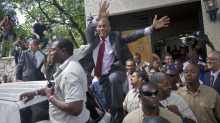 SONIA VERMA
SONIA VERMA
From Wednesday’s Globe and Mail
Published Tuesday, Apr. 05, 2011 8:54PM EDT
In one of his first moves as Haiti’s president-elect, Michel Martelly made a grand, and unusual gesture. He invited all of his country’s living ex-presidents to his upcoming inauguration.
On one level, the idea of the recently returned Jean-Bertrand Aristide sitting beside his historic rival Jean-Claude Duvalier to mark a former carnival singer’s rise to power, is pure theatre.
But to Haitians, the prospect of political enemies casting aside their differences for a common cause is appealing. And to Mr. Martelly (stage name Sweet Micky), presiding over such a scenario is even more so.
Analysts predict the 50-year-old dark-horse winner of Haiti’s election will attempt to use this peculiar mix of showmanship and statesmanship to govern his troubled country.
Without any political experience, with a deeply checkered past and surrounded by a cast of advisers that includes his cousin, a voodoo priest, Mr. Martelly is facing an uphill battle.
“I think there are high expectations on the part of the people who voted for him but at the same time, there are serious doubts about whether he can do the job,” said Robert Fatton, a politics professor at the University of Virginia.
Mr. Martelly told reporters his first 100 days in office would be devoted to restoring the rule of law by appointing judges to vacant seats.
The international community has withheld millions of dollars of aid to the earthquake-ravaged nation pending the election of a new president. Presumably, Mr. Martelly will use the promised funds to make good on his campaign promise to move Haiti’s displaced and homeless population into permanent shelter.
He has promised to launch an anticorruption crusade, to trim what his campaign called $900-million in “wasted money” in the Haitian government. He has also vowed to tackle the thorny issue of agricultural reform to increase exports and eliminate Haiti’s reliance on imported food.
Although Mr. Martelly’s politics place him on the right of the political spectrum, he has broad-based appeal. His supporters compare him to Mr. Aristide, a former Catholic priest who cast himself as a champion of the poor. However, Mr. Martelly’s closest political ties are with remnants of the Duvalier regime and with Haiti’s defunct military.
His closest advisers include Richard Morse – musician, manager of Port-au-Prince’s storied Hotel Olofsson and a voodoo priest – and Daniel Supplice, a writer and historian. Singer Wyclef Jean was also a big supporter of Mr. Martelly’s bid for president once his own run was disallowed.
Prof. Fatton, the political scientist, said voters were swept away by Mr. Martelly’s promise of change.
The kompas-music star, who admits to having smoked marijuana and crack cocaine, was able to present himself as a viable alternative to the status quo.
“In a way, his weaknesses became his strength, because nobody actually knows if he’s competent enough to be a president,” Prof. Fatton said.
Mr. Martelly hired a Spanish consulting firm whose staff had previously worked on Senator John McCain’s 2008 presidential campaign and on Felipe Calderon’s successful candidacy for the Mexico presidency in 2006.
In a pre-election interview with The Globe and Mail, Mr. Martelly said he first dreamt of becoming president 15 years ago, but reconsidered because of “the stress.”
He threw his hat in this time around because “a group in the [United] States … called me and proposed.”
He has said he raised the money for his initial campaign through personal donations totalling $1-million. The second campaign cost approximately $6-million.
“One of the interesting things is that we’ve never been told how he managed to get that money,” Prof. Fatton said, suggesting the nature of Mr. Martelly’s ties to the Haitian establishment he purports to oppose remain murky.
Chalmers LaRose, a political science professor at the University of Quebec in Montreal, described Mr. Martelly, who is the son of a petroleum plant supervisor and briefly enlisted in the Haitian Military Academy before dropping out and moving to Colorado, as a “friend of America.”
“He worked there, he performed there and he lived there. … The Americans will be reassured that he has the backing of the population and doesn’t threaten their interests on the ground,” he said.
He acknowledged the tension between Mr. Martelly the politician and Sweet Micky the performer.
“Really they are two sides of the same coin,” he said. “You cannot have one without the other.”
THE VICTORS AND THE ALSO-RANS
Only rarely do the famous reach the highest office in the land
It’s not uncommon for celebrities to parlay their popularity into public office, like Arnold Schwarzenegger and Jessie Ventura in the United States or Glenda Jackson in Britain. It’s rare, though, for the famous to reach the highest office in the land like Michel (Sweet Micky) Martelly did in Haiti.
Only two others came to mind:
Ronald Reagan
The Gipper made more than 50 films and served as California governor, but his candidacy for the U.S. presidency provoked a lot of initial snickering until he began to win the early primaries and went on to become one of America’s most beloved leaders.
Joseph Estrada
After a 33-year acting career in the Philippines, he transitioned into politics, first as a mayor, senator, and vice-president before being elected president in 1998. He was ousted after fewer than three years and later convicted of corruption.
At least two others came close:
Ruben Blades
The Panamanian salsa singer and actor is also a Harvard-educated lawyer, but it wasn’t enough get him more than a third place in the country’s 1994 presidential election.
George Weah
A Harvard education did win out in Liberia, where Ellen Johnson Sirleaf and her American Ivy League degree beat the former world footballer of the year for the presidency in 2005. After the loss, Mr. Weah enrolled in business administration at DeVry University in Miami.